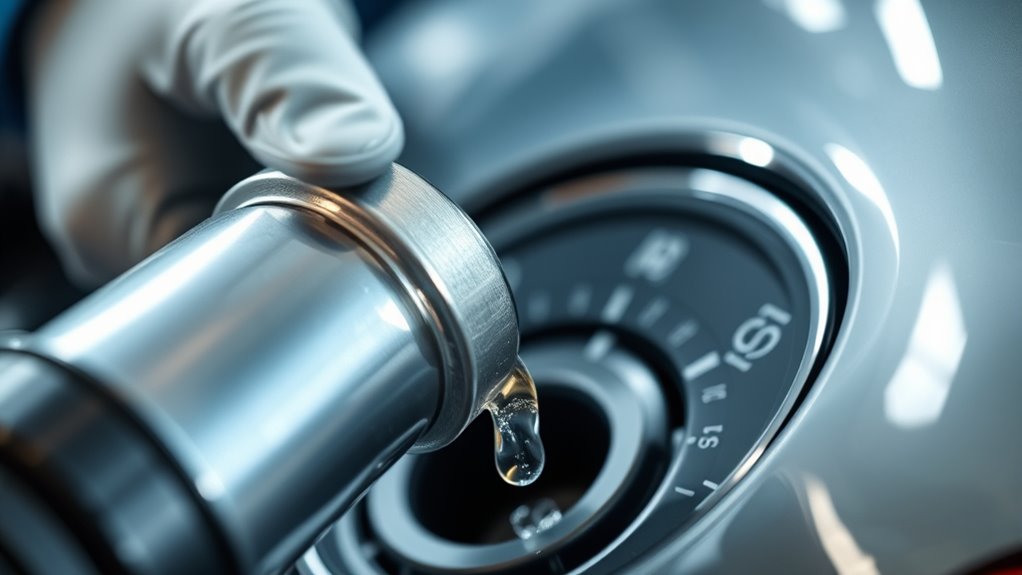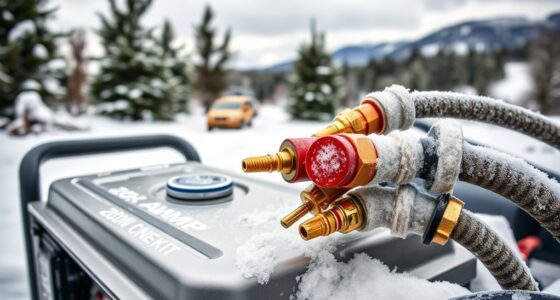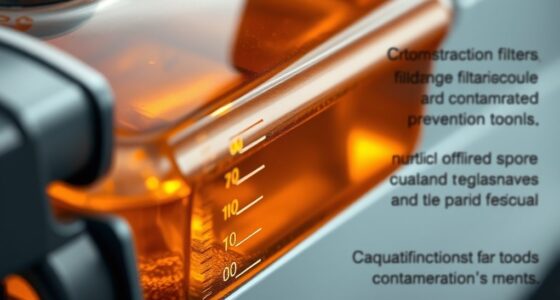Many myths surround fuel quality and contamination, but proper handling, storage, and maintenance are what truly matter. You don’t need to worry about low-quality fuel causing immediate damage if stored correctly and treated with additives when necessary. Regularly inspecting filters, keeping tanks full, and using reputable sources prevent most contamination issues. Understanding these facts helps protect your engine efficiently—keep exploring to learn how simple steps can make a big difference.
Key Takeaways
- Proper storage, not fuel grade alone, preserves fuel quality and prevents degradation over time.
- Water in fuel often causes no harm if stored correctly; contamination mainly comes from leaks or condensation.
- Fuel additives are helpful but secondary; good fuel quality and proper storage are more effective.
- Modern engines are compatible with ethanol-blended fuels when used and stored properly, debunking common myths.
- Regular maintenance, clean tanks, and reputable fuel sources are essential to prevent contamination and extend fuel lifespan.
Debunking the Myth: Is Low-Quality Fuel Always a Problem?

Many people assume that any low-quality fuel will inevitably cause engine problems, but that’s not always true. Proper fuel storage can extend the life of fuel, preventing degradation that might lead to issues. Using fuel additives can also help improve fuel quality, especially if storage times are longer. These additives can stabilize fuel, prevent gumming, and reduce moisture buildup, which often causes contamination. Not all low-quality fuels are immediately harmful if stored correctly and treated with the right additives. Additionally, understanding fuel technology reveals that advancements can mitigate some effects of lower-grade fuel. It’s important to understand that fuel quality depends on storage conditions and the use of additives, rather than just initial fuel grade. When managed properly, even lower-grade fuel can perform reliably without damaging your engine.
Separating Fact From Fiction: Does Storage Time Really Affect Fuel Quality?
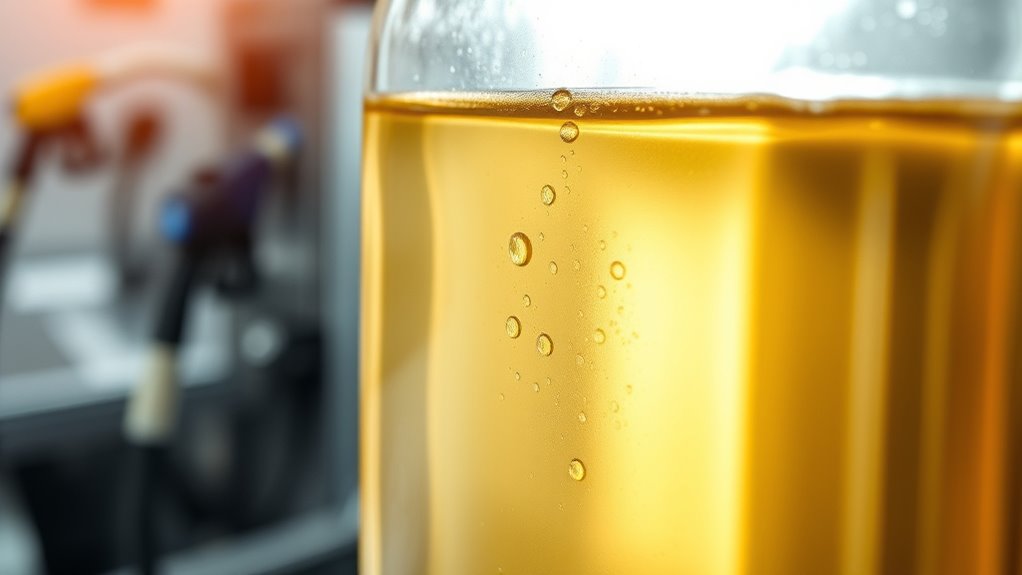
While it’s a common belief that storing fuel for extended periods inevitably degrades its quality, the reality is more nuanced. Storage duration does influence fuel aging, but other factors also matter. Proper storage conditions, like sealed containers and stable temperatures, slow down fuel aging. Fuel in ideal conditions can remain usable for months without significant quality loss. Contaminants or moisture introduced during storage can cause issues regardless of storage time. Additionally, using appropriate storage equipment can help preserve fuel quality and prevent contamination over time. Understanding these points helps you assess whether your stored fuel remains reliable. The key isn’t just how long fuel sits, but how well it’s stored. If stored correctly, fuel can stay effective beyond typical expectations, challenging the myth that all stored fuel quickly becomes unusable.
The Truth About Fuel Additives: Do They Actually Improve Your Fuel?
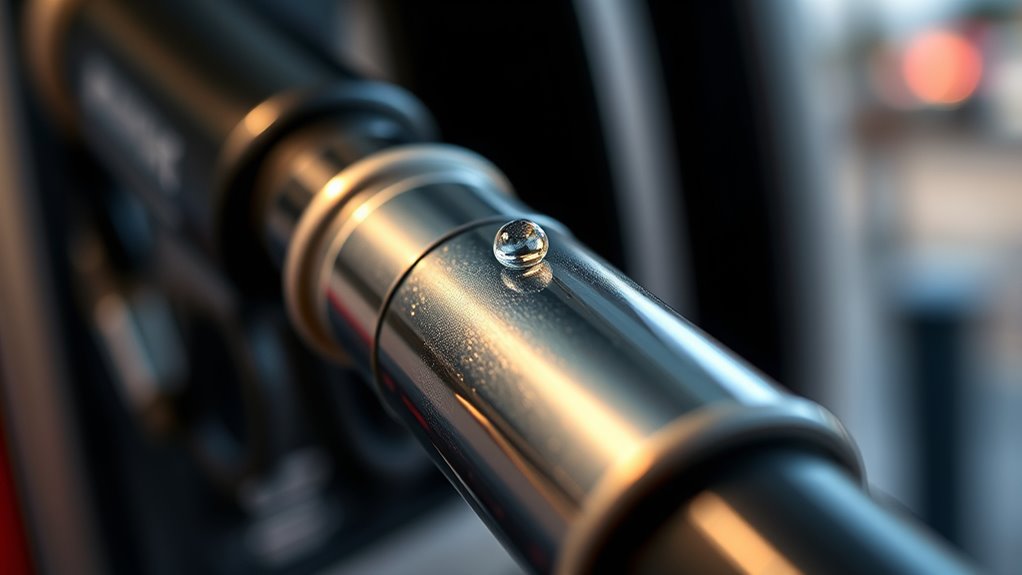
Fuel additives are marketed as solutions to enhance performance, improve engine efficiency, or extend fuel shelf life. However, their actual effectiveness depends on the specific additive and fuel quality. Many additives claim to prevent corrosion, clean injectors, or improve combustion. But, for the average driver, these benefits often don’t justify the cost. Additionally, storage duration can impact fuel quality more than additives. Over time, fuel can degrade naturally, leading to issues regardless of additives. Some additives may help in short-term storage, but they aren’t magic fixes for poor fuel quality. It’s essential to focus on using high-quality fuel and proper storage practices. In most cases, maintaining good fuel storage habits is more effective than relying solely on fuel additives to improve your fuel. Proper storage conditions can significantly influence fuel longevity and performance.
Common Misconceptions About Fuel Contamination and How It Happens

Many people believe that water in fuel always causes damage, but small amounts often don’t harm your engine. You might think contamination only happens from dirty tanks, yet it can also come from storage or transportation. Knowing the real sources helps you better protect your fuel and avoid costly issues. Additionally, contamination can occur during the industrial juice manufacturing process, highlighting the importance of proper handling and quality control measures.
Contamination Sources Unveiled
Understanding how fuel contamination occurs is essential, yet misconceptions often lead to overlooked risks. Many assume contamination only happens from external sources, but it can originate from within your fuel storage or additives. Common sources include:
- Poor fuel storage practices — moisture buildup and exposure to contaminants can introduce dirt and debris.
- Inadequate fuel additives — improper or expired additives can promote microbial growth or chemical reactions, degrading fuel quality.
- Contaminated fuel suppliers — using fuel from unreliable sources increases the risk of impurities and contaminants entering your system.
Knowing these sources helps you take targeted precautions. Proper fuel storage, using reputable suppliers, and understanding fuel additives’ role are key to preventing contamination and maintaining fuel integrity.
Misconceptions About Water
One common misconception is that water contamination only occurs from external sources, such as rain or environmental exposure. In reality, water intrusion can happen internally through condensation or fuel evaporation, which creates vapor that condenses into water inside the tank. This moisture often goes unnoticed but can lead to significant contamination over time. Fuel evaporation exposes the fuel to temperature fluctuations, causing vapor loss and creating conditions for water to condense. Many believe that sealing tanks prevents water issues entirely, but without proper maintenance, water can still accumulate through small leaks or condensation. Understanding that water can enter tanks from both external and internal sources helps you better prevent contamination and maintain fuel quality. Additionally, implementing regular tank maintenance routines and monitoring fuel conditions can significantly reduce the risk of internal water buildup.
What Causes Fuel Contamination and How Can You Prevent It?

What exactly leads to fuel contamination, and how can you effectively prevent it? Contaminants often originate from water intrusion, microbial growth, and poor fuel stability. Water can enter tanks through condensation or leaks, promoting microbial growth that produces sludge and acids. Microbial growth thrives in damp, stagnant fuel, degrading quality and causing engine issues. To prevent this, ensure your storage tanks are sealed tightly and regularly inspect for leaks. Use fuel stabilizers to maintain fuel quality over time, especially if storage periods are long. Additionally, keep tanks clean and dry to inhibit microbial activity. Regular testing and proper handling are key to maintaining fuel integrity and avoiding contamination that can damage engines and reduce performance. Implementing proper fuel storage practices can significantly reduce the risk of contamination and extend the lifespan of your fuel system.
The Role of Fuel Filters: Are They the Ultimate Defense?

Fuel filters play a vital role in protecting your engine by trapping contaminants before they reach critical components. Proper fuel filter maintenance is essential to guarantee it functions effectively, preventing dirt, rust, and debris from clogging injectors or damaging your engine. While fuel filters considerably improve filtration effectiveness, they aren’t a foolproof shield against all contaminants. Over time, filters can become clogged or less efficient, which can compromise their protective role. Regular inspection and timely replacement are key to maintaining ideal filtration. Relying solely on a fuel filter as the ultimate defense can be misleading; it’s just one part of a complete approach to fuel quality and contamination prevention. Additionally, understanding fuel quality testing and implementing proper storage practices can further reduce the risk of contamination. Ultimately, consistent maintenance and good fuel practices are your best strategies for protecting your engine.
Myths About Ethanol Blends and Their Impact on Engines
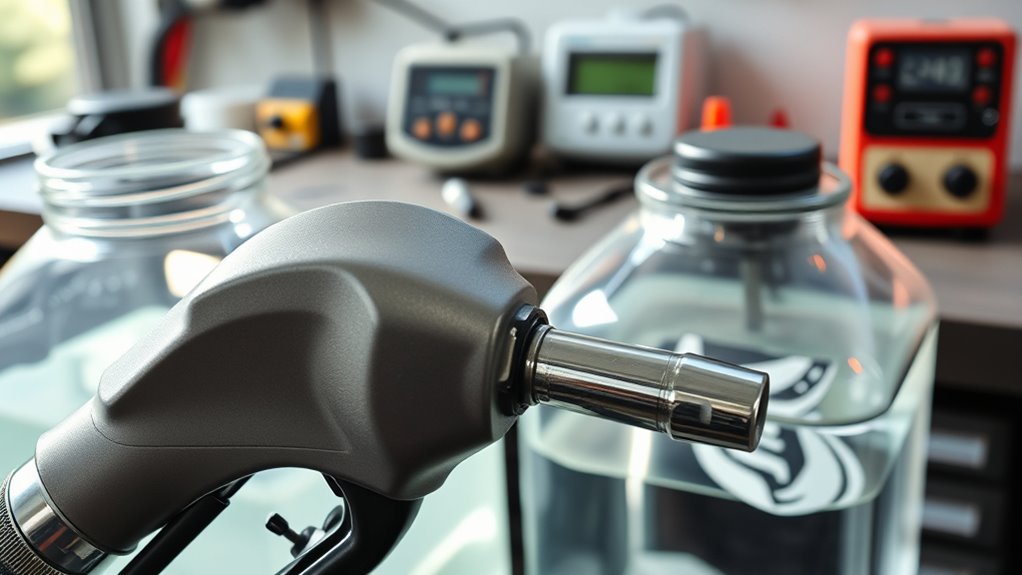
Despite common beliefs, many myths about ethanol blends and their effects on engines persist, leading to unnecessary concerns and confusion. Some think ethanol effects cause engine damage or compatibility issues, but these worries are often overstated.
- Ethanol blends damage engines—modern engines are designed for ethanol compatibility, and proper maintenance minimizes risks.
- Ethanol causes increased corrosion—using ethanol-blended fuel with correct storage reduces corrosion concerns.
- Ethanol reduces engine lifespan—when used as recommended, ethanol effects don’t harm engine durability or performance.
Understanding the facts helps you avoid unnecessary repairs and ensures proper engine operation. Ethanol effects are manageable, and most engines today are compatible with ethanol-blended fuels when used correctly. Proper fuel handling plays a crucial role in preventing contamination and maintaining engine health.
Practical Tips for Maintaining Fuel Quality and Engine Health
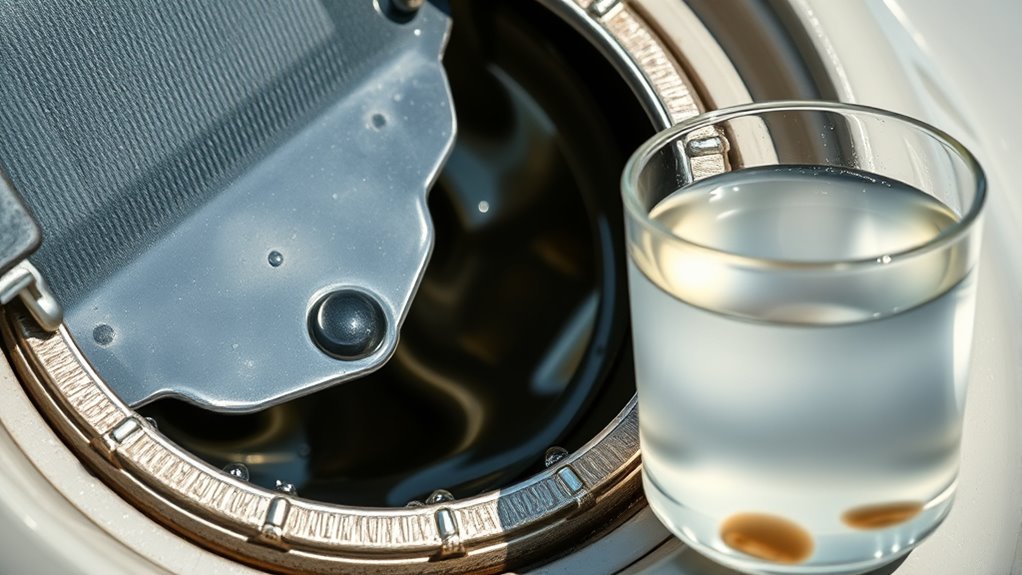
Maintaining good fuel quality is essential for keeping your engine running smoothly and avoiding costly repairs. To boost fuel efficiency and extend engine longevity, always use fresh fuel from reputable sources. Regularly inspect and replace your fuel filters to prevent contaminants from clogging your system. Keep your fuel tank full, especially during storage or long periods of inactivity, to minimize moisture buildup that can cause corrosion. Use fuel additives if recommended by your manufacturer to improve combustion and prevent deposits. Proper maintenance, like routine oil changes and spark plug checks, also supports engine health. Additionally, paying attention to fuel system maintenance can further prevent issues and promote optimal engine performance. By following these practical tips, you ensure ideal fuel quality, enhance fuel efficiency, and protect your engine from preventable damage.
Frequently Asked Questions
Can Fuel Quality Impact Engine Emissions and Environmental Safety?
Yes, poor fuel quality can increase engine emissions and harm environmental safety. When fuel contains contaminants or lacks proper additives, your engine may produce higher emissions that don’t meet emission standards. Using quality fuel with appropriate fuel additives helps your engine run cleaner, reduces harmful emissions, and ensures compliance with environmental regulations. Keep an eye on fuel quality to safeguard your engine and the environment effectively.
How Does Temperature Fluctuation Affect Stored Fuel’s Stability?
Temperature fluctuations are like a roller coaster for your stored fuel, causing it to deteriorate faster. When temperatures rise or fall unpredictably, fuel degradation accelerates, risking contamination and poor engine performance. Proper temperature control minimizes these effects, maintaining fuel stability over time. To keep your fuel in top condition, guarantee storage areas are climate-controlled, avoiding extreme shifts that compromise fuel quality and lead to costly engine issues later.
Are There Specific Signs Indicating Fuel Contamination in Engines?
You’ll notice fuel contamination signs if your engine emits a strange fuel odor or if you experience frequent engine misfires. These issues often indicate water or debris in your fuel, which can cause poor combustion. Keep an eye on engine performance and smell for any odd odors; addressing contamination early prevents more serious damage and ensures your vehicle runs smoothly. Regular checks help catch problems before they worsen.
What Role Do Different Fuel Storage Materials Play in Contamination Risk?
Different storage materials considerably influence contamination risk. You might think all materials are suitable, but material compatibility matters: using incompatible storage vessels can cause corrosion or leaching, contaminating your fuel. Choose tanks made from compatible materials like steel or certain plastics to minimize risks. Proper selection and maintenance ensure your fuel stays clean, preventing costly engine issues down the line. Don’t overlook material compatibility—it’s essential for fuel quality.
Is Regular Fuel Testing Necessary for Ensuring Long-Term Fuel Quality?
Regular fuel testing is vital for ensuring long-term fuel quality because it helps you detect contamination early. By conducting fuel testing, you can identify water, microbial growth, or impurities that may compromise engine performance. This proactive approach plays a pivotal role in contamination prevention, saving you money and downtime. Don’t overlook routine testing; it’s your best defense against fuel-related issues and maintaining ideal fuel condition over time.
Conclusion
Remember, treating fuel with care is like tending a garden—you’ll avoid weeds of contamination and let your engine flourish. Don’t buy into myths that fuel quality doesn’t matter; instead, stay vigilant, use filters wisely, and store fuel properly. With these simple steps, your engine’s performance will shine like a well-tuned symphony, running smoothly through every mile. Keep your fuel clean and your journey effortless, because your vehicle deserves the best.
